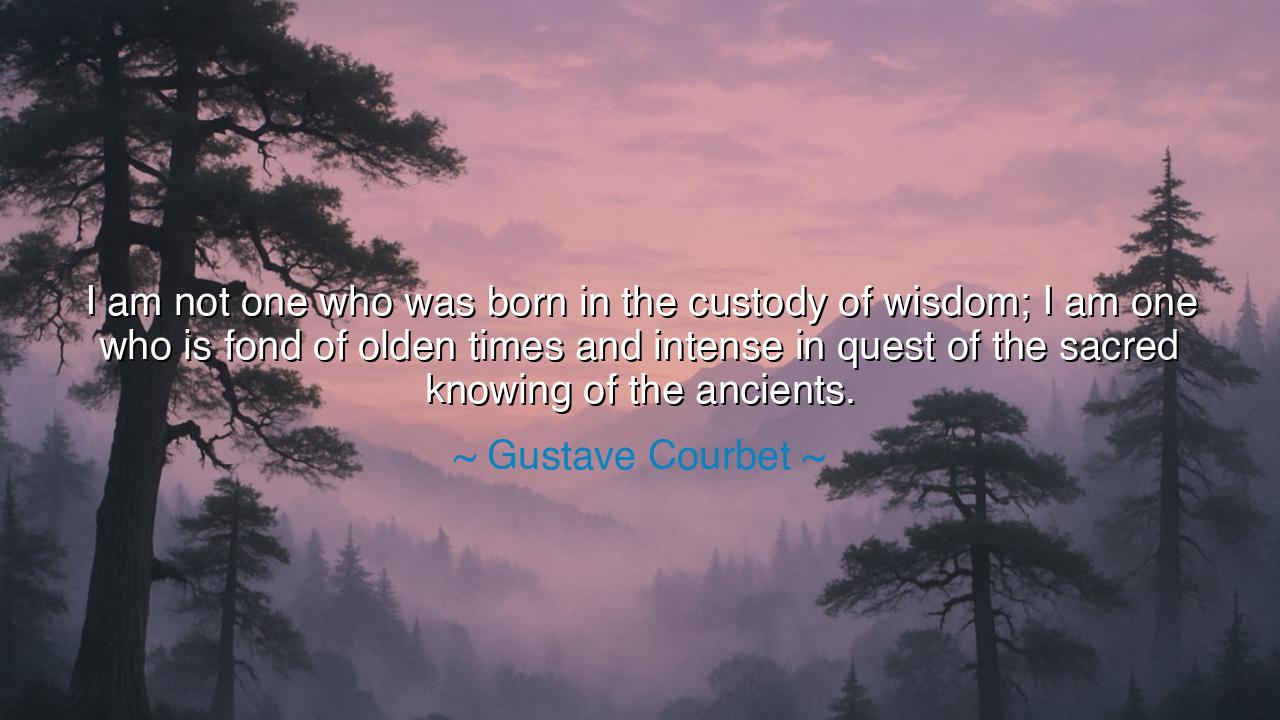
I am not one who was born in the custody of wisdom; I am one who
I am not one who was born in the custody of wisdom; I am one who is fond of olden times and intense in quest of the sacred knowing of the ancients.






Gustave Courbet, painter and rebel of his age, humbly confessed: “I am not one who was born in the custody of wisdom; I am one who is fond of olden times and intense in quest of the sacred knowing of the ancients.” In these words, he rejects the pretense of innate greatness. He admits that he was not cradled in wisdom from birth, nor did he inherit the polished traditions of the learned. Instead, his greatness came from longing, from quest, from a burning reverence for the sacred knowing of the ancients. He teaches us that wisdom is not given, but sought; not a possession, but a pilgrimage.
The ancients themselves honored this truth. Herodotus traveled the earth, gathering the stories of nations, not because he was born with all knowledge, but because his soul thirsted for it. Pythagoras journeyed to Egypt and Babylon, seeking the hidden mysteries of mathematics and spirit. Like Courbet, they confessed that they were not born in the custody of wisdom, but were lovers of the past, seekers of the eternal treasures buried in the olden times.
History bears another witness in Renaissance Europe, when artists and thinkers scoured the ruins of Rome and the manuscripts of Greece. Men like Leonardo da Vinci and Michelangelo did not claim to invent wisdom, but to rediscover and embody it. Their greatness lay in their passion for the ancients, in their hunger for the forgotten truths that could be reborn in their own time. In this way, Courbet joins a lineage of seekers who honored the ancients as guides across the ages.
Yet Courbet’s words also carry humility. He denies that he is master, claiming instead to be disciple—ever intense in quest. This humility is itself a mark of wisdom. For those who think themselves born wise are blind to their ignorance, while those who thirst after truth draw ever nearer to it. To be a lover of olden times is not nostalgia, but reverence: to learn from what endures when all else has perished.
Let the generations remember: the path to wisdom is not inheritance but quest. We are not born its custodians; we become its seekers. To honor the ancients, to pursue their sacred knowing, is to join the eternal chain of learners who carry the light across the darkness of time. For wisdom does not belong to one age alone, but is a fire passed from hand to hand, to any who desire it with a heart that burns.






H1Duong Thi Minh Hue 12C
I’m curious about the personal tone in this reflection. Courbet seems to place value on self-directed exploration rather than inherited wisdom. Does this suggest that true insight cannot be given, only earned? I also wonder how one measures success in such a pursuit—is it mastery, understanding, or a continuous striving? This makes me reflect on contemporary education and whether modern systems cultivate this kind of passionate engagement with history and ancient knowledge.
LDLoan Dieu
As a reader, I am drawn to the notion of ‘sacred knowing.’ What makes knowledge sacred rather than ordinary? Is it the age, the source, or the depth of insight? I also wonder if Courbet’s declaration reflects humility or ambition. Can someone truly dedicate themselves to understanding the ancients without becoming obsessive, or is this intensity exactly what he considers necessary? It leads me to question my own motivations in pursuing knowledge—are they practical, or idealistic?
TNgia thai nguyen
I feel a tension between admiration for the past and the necessity of experiencing the present. Does intense pursuit of ancient wisdom risk disconnecting someone from contemporary realities? Or, conversely, does grounding oneself in historical understanding enhance one’s engagement with modern life? I’m curious about Courbet’s own practice—did he study ancient works academically, or was it more a personal, intuitive exploration? This sparks questions about how to bridge past and present thoughtfully.
PTle phuong thao
This statement provokes me to think about the personal journey toward wisdom. If one is not born wise but seeks the sacred knowledge of the ancients, what qualities are most essential—curiosity, discipline, humility, or perhaps something else entirely? I wonder if Courbet sees this pursuit as a lifelong quest without end, and whether it implies a solitary path or one that thrives in dialogue with others who share the same devotion.
CTLam Gia Cat Tuong
I’m intrigued by the idea of being 'fond of olden times.' Does this imply nostalgia, or is it a deeper intellectual pursuit? I question whether longing for the past can coexist with progress and innovation. Can someone who reveres the ancients contribute something new to contemporary thought, or does focusing on the sacred knowing of the past risk stagnation? It makes me reflect on how we interpret history in modern life.